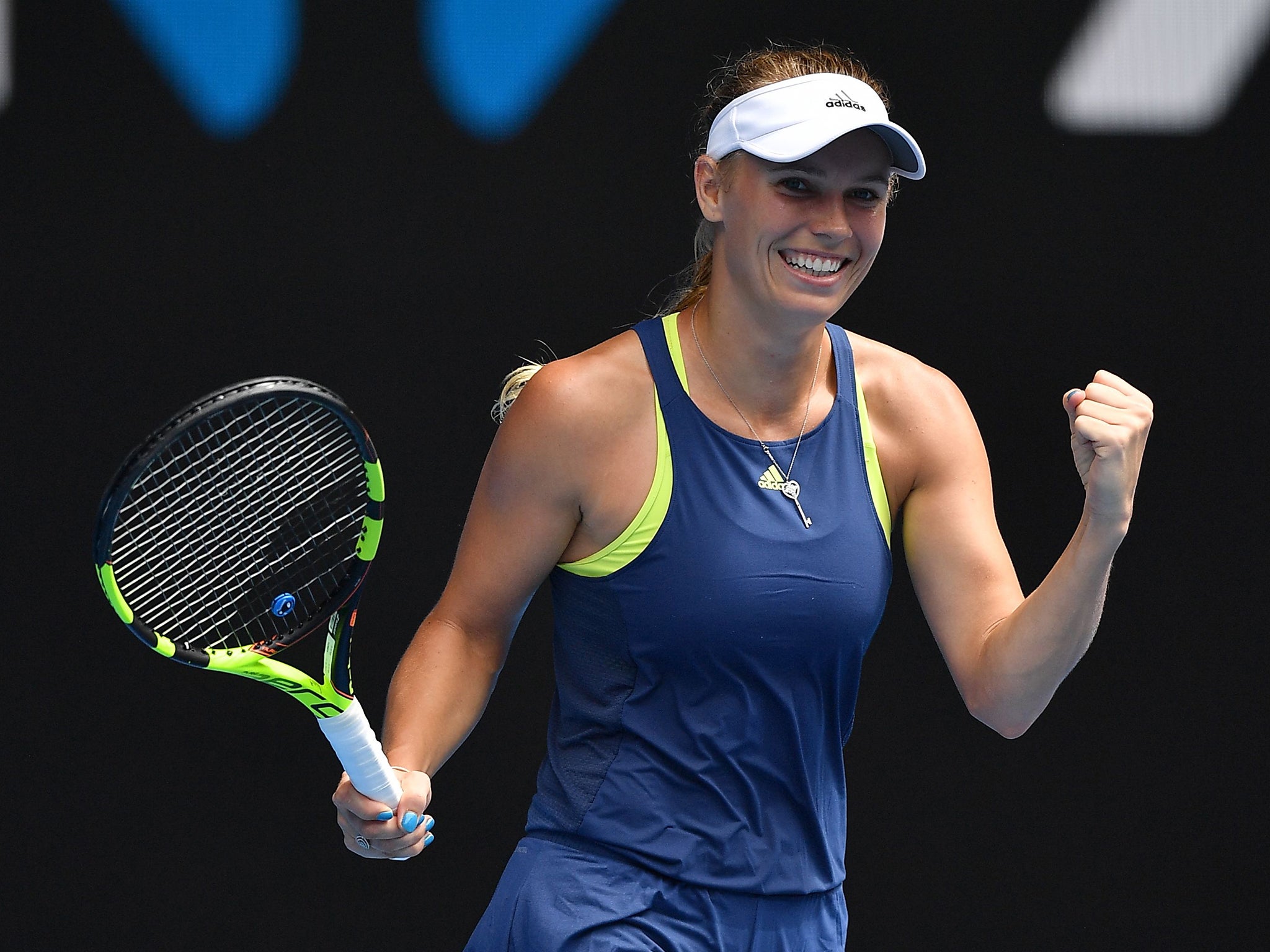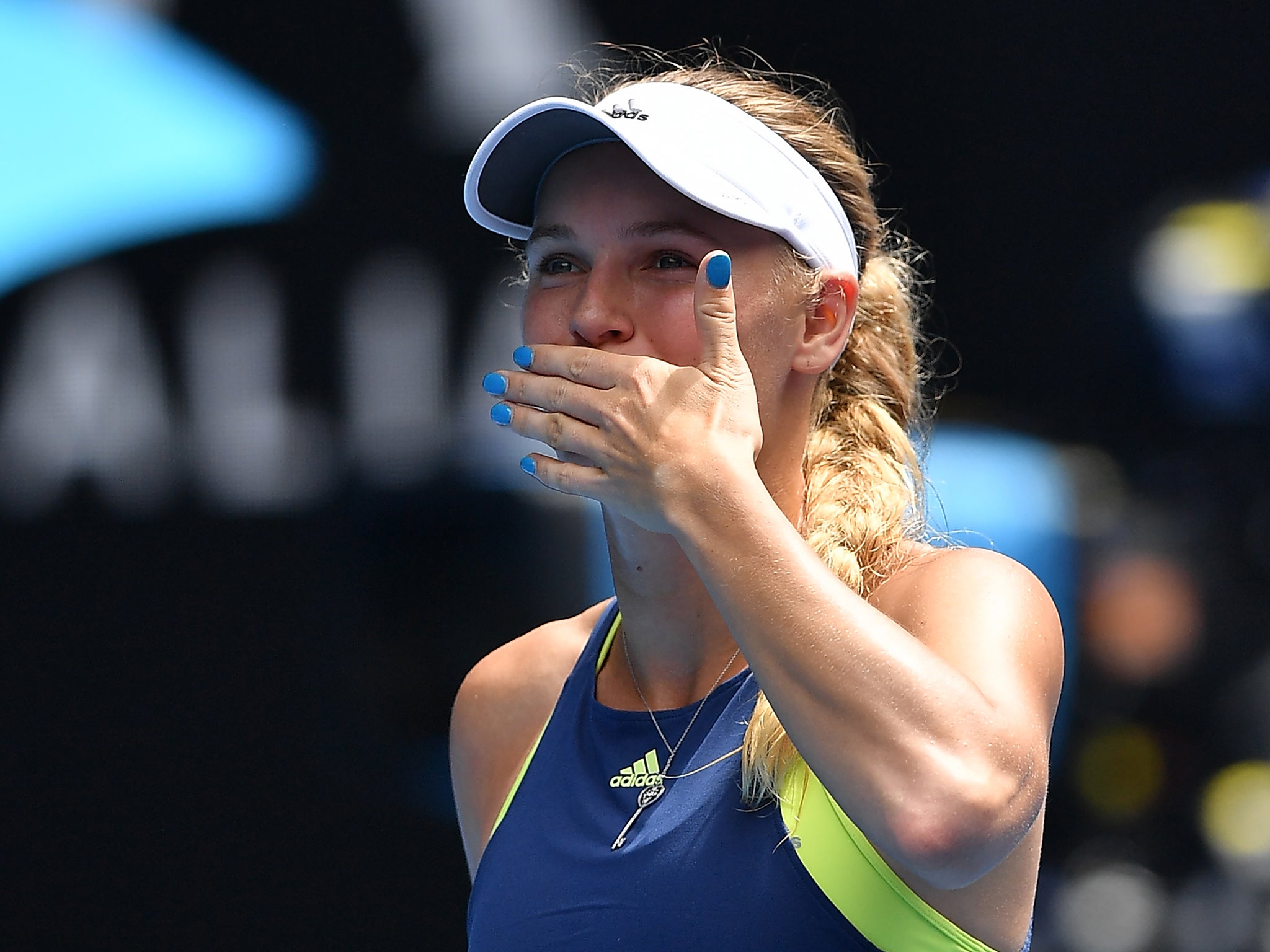Australian Open: Caroline Wozniacki making the most of second chance with win over Magdalena Rybarikova
The world No 2 was a point away from elimination in the second round but has rallied to reach the last eight

Your support helps us to tell the story
From reproductive rights to climate change to Big Tech, The Independent is on the ground when the story is developing. Whether it's investigating the financials of Elon Musk's pro-Trump PAC or producing our latest documentary, 'The A Word', which shines a light on the American women fighting for reproductive rights, we know how important it is to parse out the facts from the messaging.
At such a critical moment in US history, we need reporters on the ground. Your donation allows us to keep sending journalists to speak to both sides of the story.
The Independent is trusted by Americans across the entire political spectrum. And unlike many other quality news outlets, we choose not to lock Americans out of our reporting and analysis with paywalls. We believe quality journalism should be available to everyone, paid for by those who can afford it.
Your support makes all the difference.The experience of going so close to losing here in the second round of the Australian Open has had only a positive impact on Caroline Wozniacki. The world No 2, who saved two match points and came back from 5-1 down in the deciding set to beat Jana Fett last week, is through to the quarter-finals here for the first time in six years thanks to a thumping 6-3, 6-0 victory on Sunday over Slovakia's Magdalena Rybarikova.
“I think being almost out of the tournament, you have nothing to lose after that,” Wozniacki said after securing a quarter-final meeting with Spain’s Carla Suarez Navarro. “You just go out there and you enjoy yourself. I played really well from being down 5-1. Since then I've just kept that going.”
Wozniacki’s confidence was such that she even played a between-the-legs “tweener” during the first set, although she did not win the point as Rybarikova put away the subsequent volley.
“That’s the first time in a match,” Wozniacki said. “If I may so myself, I’m pretty proud of that. I’ve made a few ‘tweeners’ in practice, but never in a match – and even in practice I sometimes make a fool of myself.”
Wozniacki, who could return to the top of the world rankings at the end of this tournament for the first time since 2012, had rarely found her best form at the start of the new season but was flying by the time she dropped only six points in the second set against Rybarikova, who reached the semi-finals at Wimbledon last summer.
“I thought I played very well today,” Wozniacki said. “I tried to stay aggressive. I got a lot of returns back, which I think for her was obviously something that she felt pressure on after a little bit.”
Asked if she felt she was getting back to her best, Wozniacki said: “I think we always can improve. I think the fun thing and the most frustrating thing about tennis is that you can always get better. You can even see that with Roger [Federer] or Rafa [Nadal], who are obviously two of the best players ever.
"They come back year after year and they play even better, though you think it’s almost impossible. I think it just inspires everyone else to try to step it up, try to play better, too. I’m always thinking that if they can get better, then I can too.”
Suarez Navarro, a former top 10 player who is now No 39 in the world after an injury-disrupted 2017, was pushed to the limit by Anett Kontaveit before winning 4-6, 6-4, 8-6.

Kontaveit, who was aiming to reach the quarter-finals of a Grand Slam tournament for the first time, appeared to be on the way to a memorable victory when she led by a set and 4-1, but a double fault handed back one break of serve and Suarez Navarro went on to level the match.
The 22-year-old Estonian served for the match at 5-4 in the deciding set only to drop serve again. Four games later Suarez Navarro converted her third match point when Kontaveit missed a forehand.
Suarez Navarro, who is through to the quarter-finals here for the third time, thought her experience had been a decisive factor, though she felt that playing more aggressively from the second set onwards had also helped her to turn her fortunes around.
Suarez Navarro is the last player left in the women’s singles who has a single-handed backhand. The Spaniard said that Justine Henin, who had one of the best single-handed backhands in history and at 5ft 5in was only an inch taller than her, had been a major inspiration.
“We don’t have too many players with a one-handed backhand,” Suarez Navarro said. “Justine did and I saw a lot of her matches. I liked it because players like Amelie Mauresmo [who also had a one-handed backhand] slice more than Justine.
“Justine [attacked] all the time, against the Williams sisters, against players who were taller than her, against players with more power. She was one of my favourite players when I was growing up.”

Suarez Navarro thinks that single-handed backhands have gone out of fashion because of the demands for more power. “When you hit the ball with one hand, it’s not the same as if you hit with two,” she said. “People who play with two-handed backhands also win matches and big tournaments, but maybe we can open the court a little bit more with the angle and maybe we slice a little bit better.”
Wozniacki has won five of her seven meetings with Suarez Navarro, but the Spaniard won their most recent encounter in Madrid on clay last year.
“We’ve played each other a lot,” Suarez Navarro said. “I know how she plays. I know how tough she is. It will be a really tough match. She fights for every ball, but at the same time she can play aggressive. She has a lot of experience in these rounds.”
Wozniacki said: “I’m expecting a tough fight. I think she had a tough season last year and had a few injuries. Obviously she’s back playing really well.”
Join our commenting forum
Join thought-provoking conversations, follow other Independent readers and see their replies
Comments